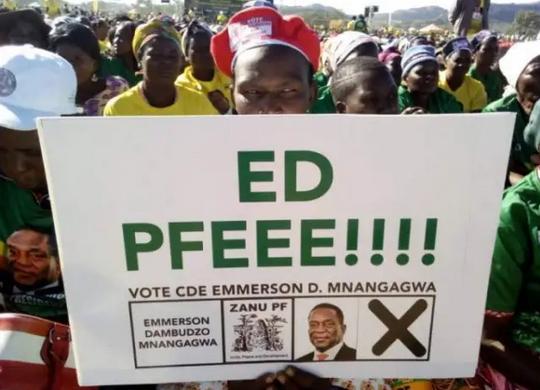News / Local
US think tank warns of civil unrest over push for Mnangagwa 2030
22 Dec 2024 at 11:16hrs |
1 Views

A United States-based think tank has raised alarm over the growing push by President Emmerson Mnangagwa's loyalists to extend his term of office from 2028 to 2030, warning that it could lead to widespread civil unrest and further isolate Zimbabwe on the international stage.
The Robert Lansing Institute's new report, titled Securing a Third Term: Strategies, Risks, and Implications for Zimbabwe's Democracy, suggests that attempts to amend the constitution to allow Mnangagwa to extend his presidency could destabilize the country. The institute warns that such a move could set off legal challenges, provoke public resistance, and even lead to violence.
"Amending the constitution to allow a third term could face legal challenges and would likely require a national referendum, posing significant hurdles," the report notes. "There is potential for public resistance, as citizens may view the move as undermining democratic principles, leading to civil unrest or increased support for opposition movements."
Mnangagwa, 82, has repeatedly stated that he is not interested in extending his term beyond the two constitutionally-mandated terms, with his first term beginning in 2018. However, reports from within his Zanu PF party indicate rising infighting, with grassroots structures trying to prevent Mnangagwa loyalists from pushing through a referendum that could support his 2030 agenda.
The Robert Lansing Institute predicts that the push for a third term could further isolate Zimbabwe internationally, with the risk of diplomatic sanctions or economic consequences. "Pursuing a third term could attract criticism from the international community, potentially resulting in diplomatic isolation or economic sanctions, further impacting Zimbabwe's economy," the report states.
While the think tank acknowledges that countries such as China and Russia might support Mnangagwa's third-term ambitions due to geopolitical interests and Zimbabwe's natural resources, it warns that the consequences for Zimbabwe's democracy could be severe.
"Pursuing a third term would likely accelerate the erosion of democratic principles in Zimbabwe, entrench authoritarian practices, and deepen public distrust in governance," the report says. "While it might solidify Mnangagwa's control in the short term, it risks long-term instability, economic decline, and the further marginalisation of Zimbabwe on the global stage."
The report also notes that regional bodies like the Southern African Development Community (SADC) and the African Union (AU) might tacitly support Mnangagwa's extended rule, prioritizing stability in Southern Africa over the erosion of democratic norms in Zimbabwe.
"As Zimbabwe's neighbour and largest trading partner, South Africa has a vested interest in stability," the report adds. "Mnangagwa's leadership, while controversial, might be viewed as less destabilizing compared to a potential leadership vacuum or a contested transition."
The push for an extended term comes after Mnangagwa's predecessor, Robert Mugabe, was ousted in a 2017 coup following years of political infighting and a failed attempt to manage succession within Zanu PF.
Opposition leaders have strongly condemned the idea of a third term, with many warning that it could plunge the country back into dictatorship and undo the gains of Zimbabwe's democratic processes.
The Robert Lansing Institute's new report, titled Securing a Third Term: Strategies, Risks, and Implications for Zimbabwe's Democracy, suggests that attempts to amend the constitution to allow Mnangagwa to extend his presidency could destabilize the country. The institute warns that such a move could set off legal challenges, provoke public resistance, and even lead to violence.
"Amending the constitution to allow a third term could face legal challenges and would likely require a national referendum, posing significant hurdles," the report notes. "There is potential for public resistance, as citizens may view the move as undermining democratic principles, leading to civil unrest or increased support for opposition movements."
Mnangagwa, 82, has repeatedly stated that he is not interested in extending his term beyond the two constitutionally-mandated terms, with his first term beginning in 2018. However, reports from within his Zanu PF party indicate rising infighting, with grassroots structures trying to prevent Mnangagwa loyalists from pushing through a referendum that could support his 2030 agenda.
The Robert Lansing Institute predicts that the push for a third term could further isolate Zimbabwe internationally, with the risk of diplomatic sanctions or economic consequences. "Pursuing a third term could attract criticism from the international community, potentially resulting in diplomatic isolation or economic sanctions, further impacting Zimbabwe's economy," the report states.
"Pursuing a third term would likely accelerate the erosion of democratic principles in Zimbabwe, entrench authoritarian practices, and deepen public distrust in governance," the report says. "While it might solidify Mnangagwa's control in the short term, it risks long-term instability, economic decline, and the further marginalisation of Zimbabwe on the global stage."
The report also notes that regional bodies like the Southern African Development Community (SADC) and the African Union (AU) might tacitly support Mnangagwa's extended rule, prioritizing stability in Southern Africa over the erosion of democratic norms in Zimbabwe.
"As Zimbabwe's neighbour and largest trading partner, South Africa has a vested interest in stability," the report adds. "Mnangagwa's leadership, while controversial, might be viewed as less destabilizing compared to a potential leadership vacuum or a contested transition."
The push for an extended term comes after Mnangagwa's predecessor, Robert Mugabe, was ousted in a 2017 coup following years of political infighting and a failed attempt to manage succession within Zanu PF.
Opposition leaders have strongly condemned the idea of a third term, with many warning that it could plunge the country back into dictatorship and undo the gains of Zimbabwe's democratic processes.
Source - the standard
Join the discussion
Loading comments…































